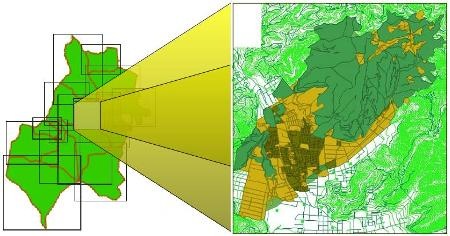GvSIG as an alternative to municipalities
 This week I will have a technical meeting of a Project that is considering gvSIG as an alternative to implement in municipalities where they execute a Territorial Ordinance project that covers part of Central America.
This week I will have a technical meeting of a Project that is considering gvSIG as an alternative to implement in municipalities where they execute a Territorial Ordinance project that covers part of Central America.
Already in Latin America different experiences are heard in the use of gvSIG, in this case I want to mention one of those that happened in Guatemala, possibly the first in the Central American region.
The systematization of experiences should be one of the best tools that gvSIG can take advantage of to disseminate and promote this tool, because not just any municipality will take it for free. There is a cost not only in implementation but also in sustainability due to many weaknesses in the Latin American context, which varies by country but generally ranges between the economic limitations of the municipalities and the instability of human resources due to the limited application of policies to promote public careers. It seems that international cooperation could play an important role in this, I already said That document, Which for now seems to be unavailable.
Perhaps the most valuable aspect of this experience in Sacatepéquez is the creation of instruments that can be useful, either for replication or for improvement. A presentation made by Fabián Rodrigo Camargo in the 3as has been posted on the gvSIG website, old but current in terms of their positions. GvSIG Conference in November 2007 in which it reflects the results obtained in this project in Guatemala.
Additionally, from this experience, Camargo returned to the community a very adequate presentation to teach a gvSIG course, which can be a good complement to the manual when teaching a course, I have used it. The maps and data necessary to carry out the practice exercises are also included.

This project was supported by the Andalusian Fund of Municipalities for International Solidarity, with the Association of Municipalities of Sacatepéquez, Guatemala. Surely it was useful, if not contemporary, what Moisés Poyatos did, in about 100 municipalities, always in Guatemala, in the Democratic Municipalities project and which I hope to speak about at another time.
It is the systematization of processes or experiences that can prolong the life of the efforts made, the summary shown of the methodology used is very sensible, although it must also have been complicated because of what gvSIG 1.1 was, so far many things have been integrated. To give an example, customizing the Reference System, it is possible from 1.3 and in the case of Guatemala, it has its own SRS, although with the 1.9 Some are still being broken in the lists because apparently the reprojection of data in the views is not consistent.
The implementation of free software in public management in developing countries constitutes an operational and economic alternative.
It allows to diminish the "technological gap", that along with other factors affects the development.
Fabián Camargo - GIS Consultant
I summarize the conclusions, which seem to me to be very correct and valid today ... and who knows whether for several years.
- The implementation of GIS in developing countries is its own necessity and a constant demand from international development cooperation organizations
- The existence of GIS in municipalities attracts researchers and offers advantages to the private company executing public works.
- Training is essential before and during GIS implementation projects
- Free Software Saves Economic Limitation in Acquiring Licenses
- The user communities, Mailing lists, etc. represent the support that organizations seek when implementing free software
- Although GIS in these countries are young, from the beginning they must contemplate the spatial data infrastructures (SDI) approach
- The existence of data in other formats is valuable, although poor in cartographic quality is very rich in reference information.
The days to be held in September this year in Argentina Are the result of the results in Latin America, which are complemented by efforts such as the Venezuela but possibly that this year one of the event's suggestions will be the creation of events in other areas of the continent where there are already seeds that others have left behind. And although there have been conferences (formal or informal), a conference in Guatemala with a Central American, Caribbean and Mexico scope for 2010 would not hurt.
There I tell you about the effort that these guys will make, that because I know a lot about their dedication and ability I know that they will be able to do a great role with gvSIG. Here you can To lower Camargo's presentation.






I thought to moderate the comment, but man, these days you have to get the good mood even in scripting.
Qe happens to them are smoked or qe this seems popo
Sons of the great whore
Thanks for the data Alvaro, just today I had a conversation with Moisés, and they are with a project supported by the European Union in which they will implement gvSIG in at least 8 municipalities in northern Honduras. For now they work on the design.
In the 4th Conference, in 2008, there was another presentation on the “Democratic Municipalities” project in Guatemala, given by Walter Girón and Moisés Poyatos.
You can consult the presentation and an article about it in:
http://jornadas.gvsig.org/
gvSIG is beginning to be a true reference in Latin America, with very positive experiences in countries such as Venezuela, Guatemala, Argentina, Brazil, Colombia ... let's hope that the XNUMXst gvSIG Conference in Latin America, which this year is organized in Argentina, will be the a meeting point for all of them and the launch of a powerful Latin American community.